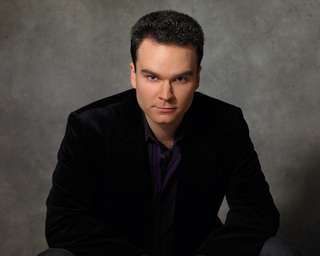|
Back
New Perspectives on Brahms' Requiem Houston
Jones Hall
09/20/2012 - and Sept 22, 2012
Johannes Brahms: Tragic Overture, Op. 81 – Nänie, Op. 82 – Ein deutsches Requiem, Op. 45
Erin Morely (soprano), Joshua Hopkins (baritone)
Houston Symphony, Houston Symphony Chorus, Hans Graf (conductor) 
J. Hopkins (© Marty Umans)
Ein deutsches Requiem stands alone. It is difficult to program 'around' this singular work, not because of its length, but because of the profundity of its content. In the Houston Symphony's second week of "Best of Brahms" outings, it was the focal point. Perhaps by preceding it with the steadfast Tragic Overture and pacific Nänie there was an attempt to shed further light on the composer's views of death and the afterlife. After the concert, however, the feeling remained that Brahms' thoughts on such matters were thoroughly set forth in the Requiem alone.
This isn't to denigrate the fine performances of the two works on the first half of the program. The overture was given an excellent ebb and flow of tension. Graf allowed strings and brass to dig in when necessary, and an extraordinarily glorious tone was coaxed from the violas in their recapitulation of the work's second theme. The unjustly neglected Nänie is a nice counterpart to the Requiem, and the opening Harmoniemusik texture brought the best out of the orchestra's principal winds. The choral singing brought excellent blend and shape to the opening polyphonic phrase and this level of singing permeated the performance. The melodic lines in the piece are long and sinuous and can in a lesser performance sound like aimless spinning out, but Graf shaped the phrases convincingly and created momentum through every bar.
Graf definitely has a point of view with Ein deutsches Requiem, one that is personal but perhaps a bit odd. Interpretive matters aside, the technical aspect of the performance was a mixed bag. Pride of place goes to the two vocal soloists, both of whom sang with rich tone and diction, carrying effortlessly over the orchestra. Joshua Hopkins was in turn doleful and evangelical in his two movements, and Erin Morely showed supreme control in the high-lying passages of "Ihr habt nun Traurigkeit." The Houston Symphony Chorus is a fine ensemble, who maintains an extremely high standard. Something seemed a bit off in this performance, though. It was unusually easy to pick out individual voices, and the extreme upper and lower registers occasionally revealed a rawness to the ensemble's tone (which was effective in some passages). Here and there releases were a bit loose, but these are all small complaints. Other aspects of the singing revealed excellent clarity in fugal passagework and exquisite tonal blend, especially in the final moments.
The distinctiveness of Graf's interpretation arose mostly out of tempo choices. "Wie lieblich sind deine Wohnungen" was treated like a Ländler and came across bucolic instead of reverential and awestruck. The opening of the Requiem was "very" instead of "somewhat" slow and, at the end of the movement, the pulse had quickened noticeably. The moods of the culminating fugues in the second, third and sixth movements were flat instead of differentiated as defiant, ecstatic and triumphant, respectively. On the other hand, the moments of potency–the massive choral forces in unison in "Denn alles Fleish" and the smoldering harmonic shift at "Tod, wo ist dein Stachel?" in the sixth movement–were vigorously emphasized and created much excitement, and the recomposed return of the work's opening near the end was touchingly rendered. Regardless of the reaction to the interpretive stance, it is always welcome and refreshing to hear a major artist's individual take on a familiar work conveyed with such conviction.
Marcus Karl Maroney
|